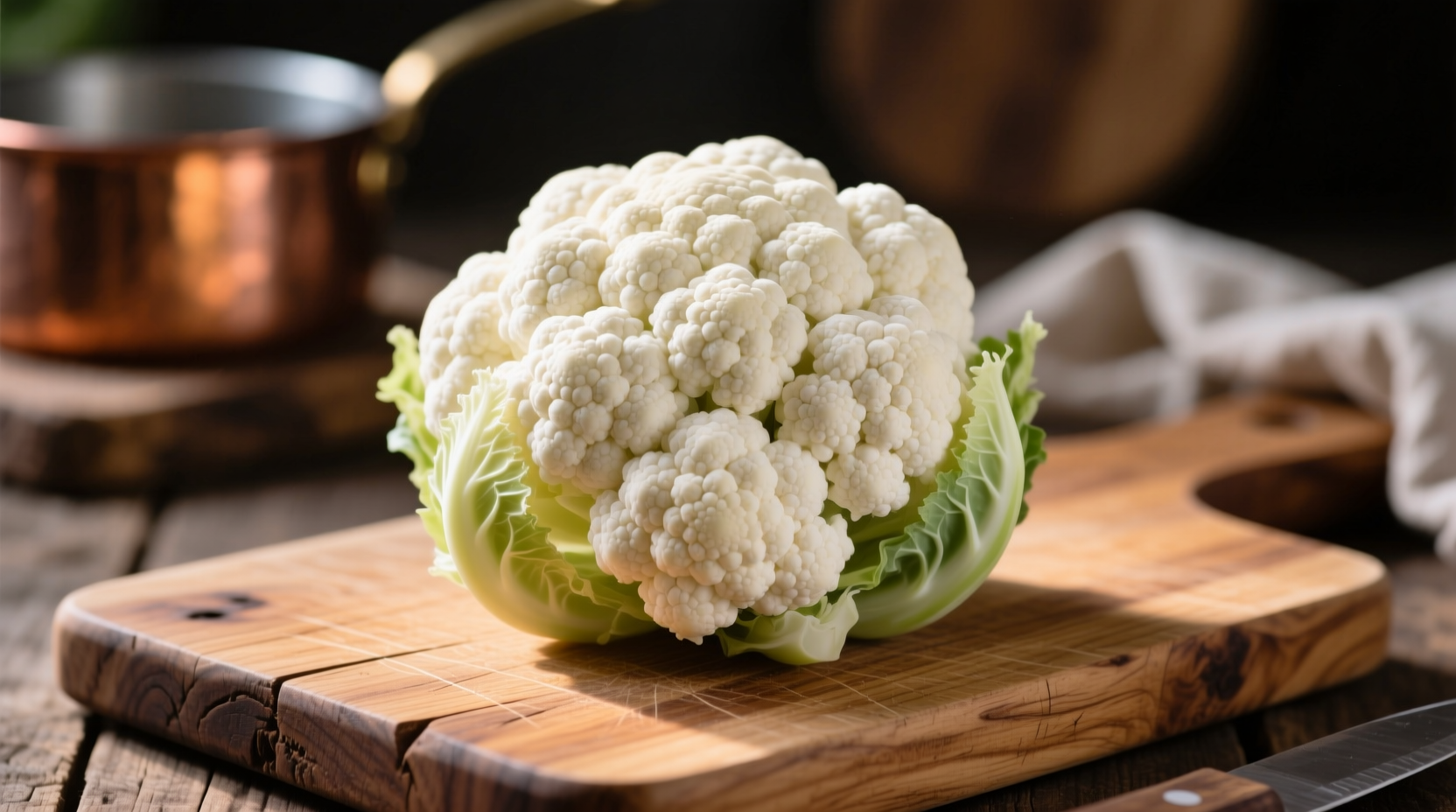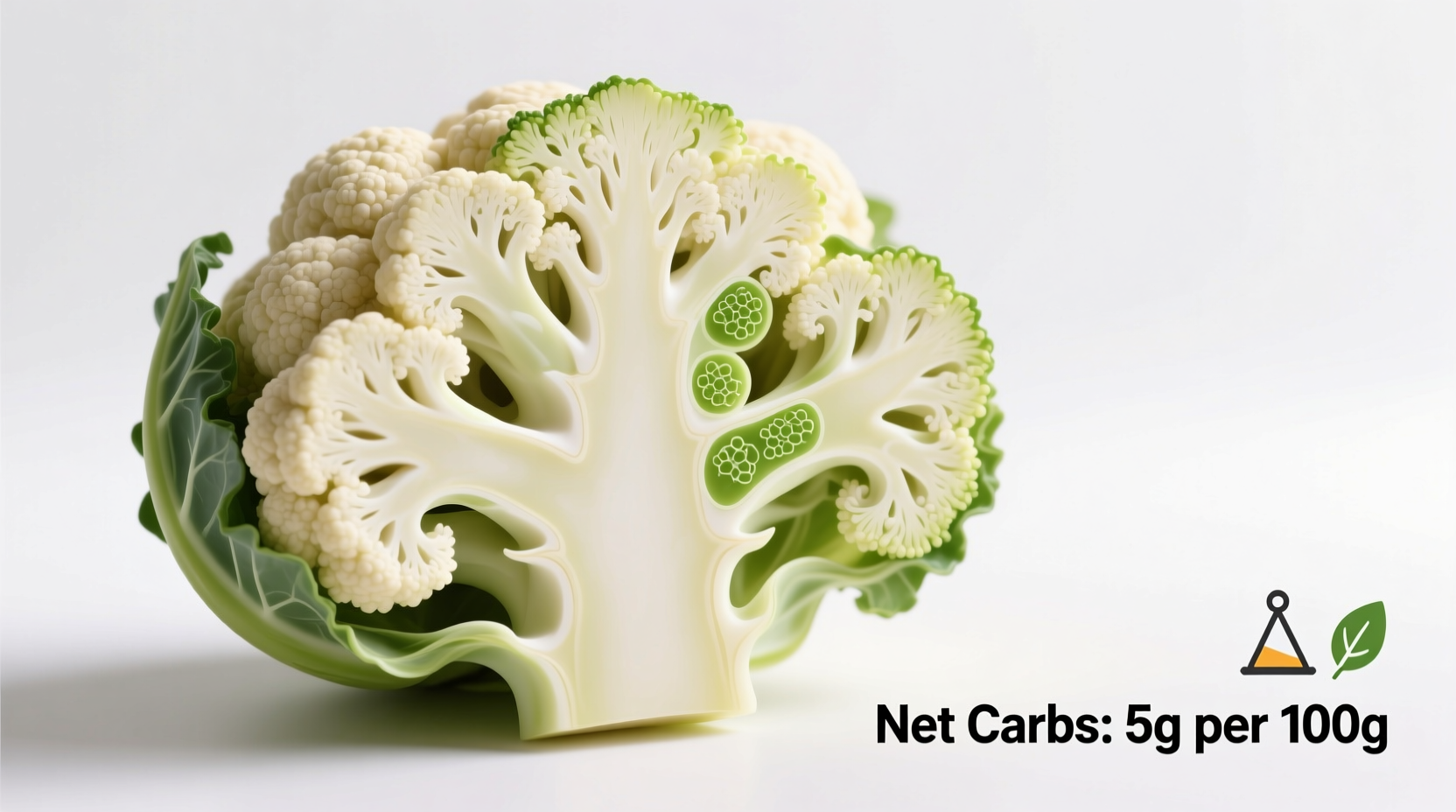Discover exactly how cauliflower fits into your nutritional goals with this comprehensive guide. Whether you're following a keto diet, managing diabetes, or simply tracking your daily carb intake, understanding the precise carbohydrate content in cauliflower can help you make informed food choices without sacrificing flavor or nutrition.
Understanding Cauliflower's Carbohydrate Profile
When evaluating "how many carbs are in a cauliflower," it's essential to distinguish between total carbohydrates and net carbohydrates. Total carbs include all carbohydrate types present in the food, while net carbs subtract fiber and sugar alcohols, which don't significantly impact blood sugar levels.
According to the USDA FoodData Central database, the standard nutritional profile for raw cauliflower per 100-gram serving is:
| Nutrient | Amount per 100g |
|---|---|
| Total Carbohydrates | 5.0 g |
| Dietary Fiber | 2.0 g |
| Sugars | 1.9 g |
| Net Carbs | 3.0 g |
How Serving Size Affects Carb Counting
Understanding "how many carbs are in cauliflower" requires attention to portion sizes, as nutritional values scale with the amount consumed. Here's how different common serving sizes translate:
- 1 cup chopped (100g): 5g total carbs, 3g net carbs
- Medium head (600g): 30g total carbs, 18g net carbs
- 1 floret (30g): 1.5g total carbs, 0.9g net carbs
- 1 cup cooked (118g): 5.9g total carbs, 3.5g net carbs
Notice that cooking slightly concentrates the carb content per volume due to water loss, though the actual carb count per weight remains consistent. This is crucial information for those strictly tracking their carbohydrate intake.

Cauliflower Compared to Other Common Vegetables
When considering "how many carbs are in a cauliflower" versus other vegetables, cauliflower stands out as one of the lowest-carb options available. This comparison helps contextualize cauliflower's position in the vegetable spectrum:
| Vegetable (100g raw) | Total Carbs | Net Carbs | Fiber |
|---|---|---|---|
| Cauliflower | 5.0g | 3.0g | 2.0g |
| Broccoli | 7.2g | 4.0g | 3.2g |
| Spinach | 3.6g | 1.4g | 2.2g |
| Asparagus | 3.9g | 2.1g | 1.8g |
| Carrots | 9.6g | 7.0g | 2.6g |
| Peas | 14.5g | 8.0g | 6.5g |
This comparison clearly shows why cauliflower has become so popular in low-carb and keto communities. While spinach and asparagus have slightly lower net carbs, cauliflower offers greater versatility in cooking applications while maintaining a favorable carb profile.
How Preparation Methods Impact Carbohydrate Content
Many people wonder if cooking methods affect "how many carbs are in cauliflower." The truth is that basic cooking methods like steaming, boiling, or roasting don't significantly alter the actual carbohydrate content per weight. However, they do affect the density:
- Raw cauliflower: 100g contains 5g total carbs
- Steamed cauliflower: 100g contains 5.3g total carbs (water loss concentrates nutrients)
- Riced cauliflower: 100g contains approximately 5g total carbs
- Cauliflower mash: 100g contains about 5g total carbs
What dramatically changes the carb count is when cauliflower is combined with higher-carb ingredients. For example, "cauliflower pizza crust" recipes often include cheese, eggs, and almond flour, which alter the overall nutritional profile. Always check specific recipes when tracking carbs for prepared cauliflower dishes.
Practical Applications for Different Dietary Needs
Understanding the precise answer to "how many carbs are in a cauliflower" allows you to strategically incorporate this versatile vegetable into various eating plans:
For Keto Dieters
With just 3g net carbs per 100g, cauliflower fits perfectly within keto parameters. Most keto dieters aim for 20-50g net carbs daily, meaning you could consume 300-600g of cauliflower while staying within limits. This makes it an excellent substitute for higher-carb foods like rice, potatoes, and even pizza crust.
For Diabetic Management
The American Diabetes Association recommends non-starchy vegetables like cauliflower as part of a balanced diabetes meal plan. With its low glycemic load of 1, cauliflower has minimal impact on blood sugar levels, making it a smart choice for those monitoring glucose.
For Weight Management
At only 25 calories per 100g with substantial fiber content, cauliflower provides volume and satisfaction with minimal caloric impact. This high-volume, low-calorie profile makes it ideal for those looking to manage their weight while still enjoying satisfying portions.
Common Misconceptions About Cauliflower Carbs
Several myths persist about cauliflower's carbohydrate content that deserve clarification:
- Myth: All white vegetables are high in carbs
Fact: Unlike potatoes and turnips, cauliflower is actually very low in carbs - Myth: Frozen cauliflower has more carbs than fresh
Fact: Freezing doesn't alter the nutritional profile; both contain approximately 5g total carbs per 100g - Myth: The core of cauliflower has more carbs than the florets
Fact: The carb content is consistent throughout the head, though the core is slightly higher in fiber
Maximizing Cauliflower in Your Meal Planning
Now that you know exactly "how many carbs are in a cauliflower," here are practical ways to incorporate it into your diet while staying within your carb limits:
- Substitute 1 cup riced cauliflower for regular rice (saves approximately 40g carbs)
- Use cauliflower mash instead of mashed potatoes for a fraction of the carbs
- Create low-carb pizza crusts using cauliflower (typically 5-8g net carbs per serving versus 30g+ for traditional crust)
- Add raw cauliflower florets to salads for crunch without significant carb impact
- Roast cauliflower with olive oil and spices for a satisfying side dish
When tracking your carb intake, remember that one medium head of cauliflower (about 600g) contains approximately 30g total carbs and 18g net carbs. This knowledge allows you to plan meals effectively without unexpected carb spikes.











 浙公网安备
33010002000092号
浙公网安备
33010002000092号 浙B2-20120091-4
浙B2-20120091-4